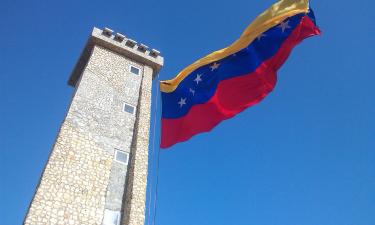Pakistan President Offered Vladimir Putin to Write a Book
Pakistan President visits Russia for the first time over the past 30 years. It is quite understandable that top talks between Moscow and Islamabad have been infrequent until recently. As is known, Pakistan actively supported Afghan Mujahideens during the war in Afghanistan, which certainly hampered relations with the Soviet Union. However, when the war was over and after the breakup of the USSR, leaders of both countries didn’t immediately rush to each other with assurances to forget the past. Especially that Russia kept on following the Soviet tradition and still supported friendly relations with India, and the latter in its turn still conflicted with Pakistan on any possible occasion, because of Kashmir first of all. To all appearances, till recently Moscow considered it was no need to make any steps toward Islamabad. Which by the way concerns Pakistan as well.
But the situation changed when India and Pakistan got nuclear weapons. As far as tension in the relations between two countries is constant and slightly changes (with the only exception when conflicts may only aggravate), it would be imprudent to keep on directing the attention and efforts toward India only. After all, Pakistan is also of significant importance for the South Asia region.
The role of Pakistan even increased when an anti-terrorist operation in Afghanistan began. Pervez Musharraf expressed his support to the USA in a possible war campaign in Iraq which pardoned all his previous sins (remember that the Pakistani president came to power as a result of a military coup). At first, when battles continued in Afghanistan, Washington devoted much attention to Pakistan. However, when Talibs were smashed up, the USA started losing interest in what was going on in Pakistan.
Besides, Washington is obviously displeased with the fact that Pervez Musharraf still fails to cope with radical Islamite groups, who often organize acts of terrorism against foreigners, even including Americans. Last year’s conflict with India wasn’t in favor of Islamabad (which by the way concerns Delhi as well). However that may be, it is likely that Pakistani president is trying to win not only support of Washington, which by the way pays little attention to Pakistan at present. The European Union is also not so much interested in Pakistan. As for Islamabad’s relations with China, they are still cooperating on the basis of enmity toward India, as many years ago.
However, it is not enough for Pervez Musharraf to enjoy support of China in order to improve the authority of Pakistan. Thus, Pakistani authorities decided to establish cooperation with Russia. During negotiations with the Russian President, the Pakistani leader offered Vladimir Putin to be “co-author of a new book” in relations between the two countries.
The number of questions to be discussed during the meeting in Moscow is not so wide, but the negotiations are dedicated to actual aspects of bipartite relations. Moscow and Islamabad are first of all interested in development of economic relations; Pakistan needs new markets for its agricultural and textile products. It is obvious that Pakistan is interested in supplies of Russian weapons. At present, India is the basic purchaser of Russian military technique (as is known, Pakistan was always displeased with this fact). The annual trade turnover between Russia and India in the armament sphere reaches 1 billion dollars, while the whole rate of the Russia-Pakistan trade turnover is not more than 100 million dollars. At that, as the Russian Ministry for Economic Development and Trade reports, the trade turnover between the two countries increased by 118% as compared with 2001 (but the information concerns only the period of January – September 2002).
By the way, before the visit of Pakistan’s president to Moscow, Vladimir Putin had a telephone conversation with Indian Prime Minister Atal Bihari Vajpayee. As the presidential press service reports, this conversation may be considered as “collation of the views” before the visit of Pervez Musharraf to Russia. It also means that Islamabad cannot expect that the currently held negotiations will somehow influence the traditionally strong relations between Russia and India. Pervez Musharraf understands perfectly well that he won’t be able to drive a wedge into the Russian-Indian relations. It is highly likely that he doesn’t even hope to achieve some success with this problem. If Islamabad persuades Moscow to pay more attention to cooperation between the two countries in the military sphere, it will be Russia not Pakistan who will have to explain the situation to India.
Another aspect of the Russia-Pakistan bipartite relations is joint struggle against terrorism. Earlier Moscow strictly criticized authorities of Pakistan for the reluctance to stand up against sorties of extremists, in Kashmir particularly. But recently, Russia has softened its position on the problem, and the parties even reached an agreement to create a joint workgroup on counteraction to international terrorism.
Before his visit to Russia, Pervez Musharraf said it was possible that Pakistan would join the Shanghai Cooperation organization. At present, the following six countries are members of the organization: Russia, China, Kazakhstan, Kyrgyzstan, Tajikistan and Uzbekistan. It is not clear yet whether the organization will increase soon. On the one hand, Pakistan may expect to enjoy China’s support in incorporation into the organization. On the other hand, it is unlikely that Russia will object to this incorporation, but it will have to take India’s opinion on the problem into consideration.
So, if Russia and Pakistan are actually interested in development of bipartite relations, they will have to deal with many difficulties to be a success with solution of the problem. As for Musharraf’s suggestion to write “a new book” of relations between Russia and Pakistan, let’s wait and see if the book will be exciting.
Vasily Bubnov
PRAVDA.Ru
Subscribe to Pravda.Ru Telegram channel, Facebook, RSS!




